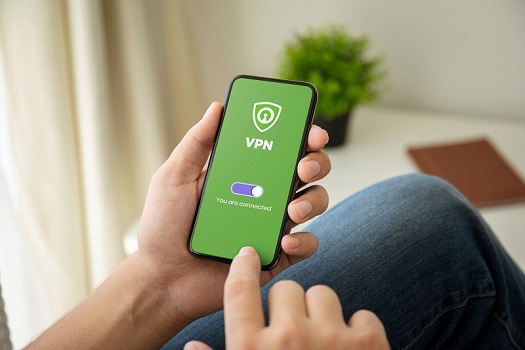Home »
Articles
9 Best Ways To Secure Your Android Phone
Here, we will discuss about some of the best ways to secure your android phone.
Submitted by IncludeHelp, on JUN 26, 2022
Most people nowadays use their smartphones for various tasks such as shopping, paying bills, and sending money, to name a few. Due to a large amount of sensitive information mobile phones hold, securing your Android phone is crucial.

Nowadays, most people use smartphones to access business emails, social media accounts, and important documents. If you don't try to protect your Android phone, it can put your entire data at risk. Remember that hackers nowadays are innovative and can readily trace and steal information.
Here are some of the best ways to secure your Android phone:
1. Use A VPN
Virtual private networks (VPNs) may be an option for protecting your Android phone. It creates an encrypted connection from your device to a remote server and moves through Internet traffic. Generally, it adds an extra layer of security to your Internet connection, so consider it a must-have on your device. If you're looking for a VPN for Android, you can find a good selection of paid options.

2. Know Everything About The Android System
Even if you’ve been an Android phone user for many years, you might overlook several crucial aspects, especially the security and privacy settings of the operating system. It might be time to re-acquaint yourself with your operating system's built-in features by doing some research.
A good start is to check out some features such as Smart Lock, Find My Device, and full-disk encryption, to name a few. Keep in mind that using the encryption feature on older or newer models may cause performance issues.
3. Utilize The Phone Locking System
The locking system of your Android phone is the initial line of protection. Although it may seem straightforward, a phone without a lock is more likely to lose data.
When you lock your device's screen, it can be helpful in various scenarios. For example, if a snatcher grabs your phone containing credit card information, by the time the snatcher can break the lock, you have enough time to block your active credit cards and bank accounts on the device.
The best way to lock your phone is by using a pin code. Although a pin code is one of the oldest security features of Android, it remains a dependable one.
4. Install Apps From The Google Play Store
If you want to keep your Android phone secure, only download apps from the Google Play Store. Avoid using third-party app stores since it can put your phone at risk for various types of viruses and malware. It's one of the quick ways for hackers to access your device.
You should also avoid using any unauthentic apps. Even if you find them on the Google App Store, avoid downloading one unless you know the developers. Although shady apps may find their way into the Google Play Store, Google's algorithms will detect and remove them immediately.
5. Install Antivirus Software
Although the built-in Google Play Protect is responsible for keeping track of possible malware, having an antivirus will help find a bug or malware in your Android phone. If you decide to get one for your phone, it'll serve as an extra layer of security.
6. Avoid Using Wi-Fi Or Bluetooth Connections In Unfamiliar Public Places
Today, you'll never know if hackers are around. If you're not careful, you might end up hacked once you connect to public Wi-Fi. The same is true for Bluetooth connections. One way to protect your Android phone from hackers is to avoid using public connections as much as possible. Only do so if truly necessary to minimize your risk of potential hacking.
7. Implement Two-Factor Authentication (2FA)
One way to ensure your Android phone is safe from hackers is by implementing two-factor authentication. Due to the increasing cases of cyberattacks, the security it provides is no longer an option.
Two-factor authentication (2FA) can help keep your accounts safe from hackers. When you have one in place, you'll receive a code on your mobile phone and email address when you try to open an account. Generally, you have a two-way security check to enter into your account.
8. Keep Your Android Device Up-To-Date
If you want to ensure your Android phone stays secure, make it a priority to keep the operating system and apps up-to-date. Unable to update the operating system can put your Android phone at risk for various security threats. Remember that most malware and bugs can exploit vulnerabilities in older software versions.
9. Don't Save Passwords For Any Application
Many smartphone users are likely to save passwords for applications they use daily. Although it saves time and adds convenience, it poses a safety risk and isn’t recommended. Make sure not to allow applications on your device to save passwords. If you find remembering all the passwords for the apps you use challenging, consider using a password manager.
Final Thoughts
Hackers are more likely to target Android phones if security steps aren't taken. Aside from hacking attempts, viruses and malware are on the rise. If you're not careful these days, all the sensitive data on your phone can be compromised. With these helpful hints for securing your Android phone, you'll have peace of mind knowing your data is always secure.
Advertisement
Advertisement